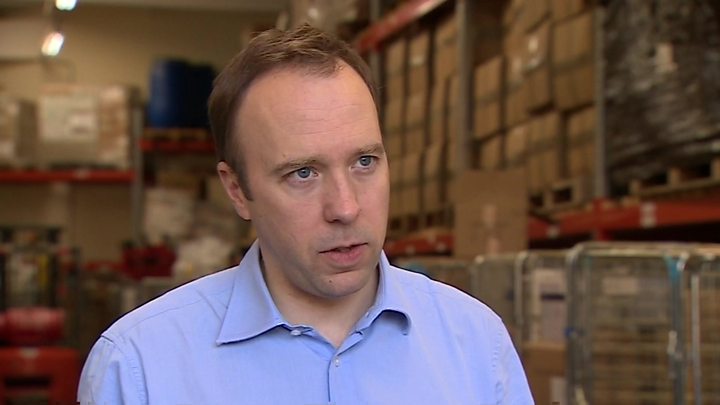
Media playback is unsupported on your device
The health secretary has acknowledged there have been “challenges” with the supply of personal protective equipment to NHS staff in England – but added he is determined to rise to them.
Last week, NHS staff said the lack of protective gear was putting them at risk during the coronavirus outbreak.
Matt Hancock said a million face masks had been bought over the weekend and he was taking the issue “very seriously”.
From this week, the Army will play a part in helping to distribute supplies.
“I am determined to ensure that the right kit gets to the right hospital, the right ambulance service, the right doctors’ surgery, right across the country,” said Mr Hancock.
“There have been challenges and I can see that. We’re on it and trying to solve all the problems.”
He added that, since last week, millions of items, including face masks, had been shipped to NHS staff across the country.
Health workers have previously warned that a shortage of personal protective equipment (PPE) – combined with a lack of coronavirus testing for them – meant they were at increased risk of getting the virus and passing it on to patients.
The Doctors Association, a lobbying group, said it members were overwhelmingly concerned that patients were being put at risk and that NHS staff could lose their lives.
Its chairman said doctors had told him they felt like “lambs to the slaughter”.
And NHS Providers, which represents health trusts in England, said there had been local shortages which were fuelling anxiety over staff safety.
While there were signs of significant increases in distribution, further rapid improvement was required, it said.
There’s been a growing chorus of complaints from the NHS frontline that personal protective equipment, such as masks, is still not universally available, even with coronavirus cases increasing rapidly.
Huge quantities are required because doctors and nurses seeing infected patients need to change their protective clothing after every consultation and treatment.
NHS England leaders and Health Secretary Matt Hancock are only too aware of the problem, hence the major new effort to get supplies to the frontline.
They say there are adequate stocks nationally but admit there have been distribution problems.
The introduction of Army personnel to try to remove bottlenecks and get more equipment to NHS staff shows how seriously this is being taken in Whitehall.
There has also been confusion over guidelines on what equipment should be worn at different times.
These were changed recently by Public Health England and hospital chiefs have called for an urgent clarification.
Mr Hancock said the government had bought a million more facemasks, had shipped 2.6 million masks over a 24-hour period, and had stocks of equipment it was trying to get to the “right people”.
The health secretary also insisted the equipment met World Health Organization guidelines.
Previously, a consultant at St George’s Hospital, London, said frontline NHS staff risked “cross infecting everybody” because they were not getting the recommended protective equipment.
Mr Hancock said a “whole load” of FFP3 masks were being sent to frontline NHS staff.
“I take very seriously my responsibility, as secretary of state, to make sure that everybody working in the NHS, across social care, is safe, and for that they need the right equipment,” he added.
On Sunday, the UK’s death toll reached 281 – including a person aged 18 with an underlying health condition – while cases rose to 5,683, according to to the latest figures.
Speaking at Downing Street’s daily news conference, Prime Minister Boris Johnson warned “tougher measures” could be introduced if people do not take the government’s coronavirus advice on social distancing seriously.
On Monday, emergency legislation that would grant powers aimed at tackling the spread of the coronavirus pandemic will be debated by MPs.
